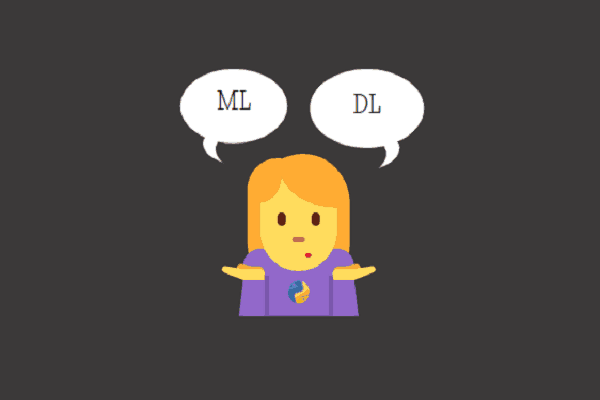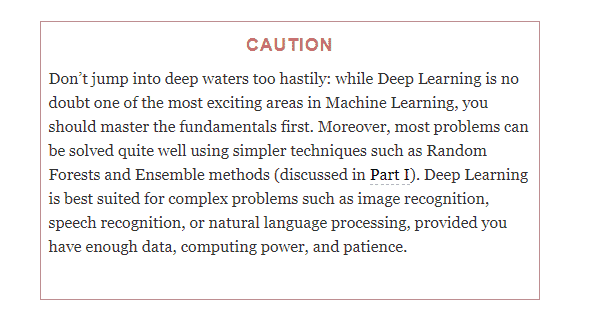I wanted to do a deep learning project for my academic purposes last month, and I was wondering whether I should learn machine learning before deep learning or not.
I’ve done some research on this topic, and I’ll help you if you also have the same doubt in your mind.

Whether you should learn machine learning before deep learning or not depends on what you need to do. Machine learning is a vast area, and you don’t need to learn everything in it. But, there are some machine learning concepts that you should be aware of before you jump into deep learning.
It is not mandatory that you should learn these concepts first. You can also learn the majority of things on the go while doing deep learning. But having some machine learning experiences will help a lot.
We know that we can’t jump into a large sea before we learn and practice swimming in a pond or swimming pool. Just like that, if you directly start deep learning without knowing the fundamental concepts needed, then it will seem overwhelmingly complex for you.
Most problems do not need deep learning. They can be solved by simpler machine learning techniques. Deep learning is mostly used for solving complex problems.
One of my favorite books on machine learning is Hands-On Machine Learning with Scikit-Learn and Tensorflow. This is one of the best books in the market to learn hands-on machine learning. Let’s see what this book has to say about this question.

This caution is from the preface of this book, which you can read here for free.
Just like this amazing book, you can see that many of the deep learning online courses and books try to teach you machine learning first and later move on to deep learning. That learning strategy is to build a solid base in your brain before grasping complex deep learning concepts.
Now you know that you need to learn some important concepts before jumping directly into deep learning.
Let’s see what concepts that you should know before you start deep learning.
What is Machine Learning?
Machine learning is the development of computer programs that can access data and use it to learn for themselves. This technology provides systems the ability to learn by themselves from experience without being explicitly programmed.
For example, if you have some data about a football (soccer) game. By analyzing the data, the machine can find some relationships between different values.
Let’s say that there is a relationship between ball possession and matches won. The machine can predict some results using this data. For example: When a team keeps 60% ball possession, there is a 75% chance of that team winning.
This is just a simple example of machine learning. Some of the problems that are solved using machine learning are:
- Classification of data
- Regression ( Predicting future values based on previous data)
- Clustering (Grouping the given data into different clusters)
- Finding associations between different data
If you want to learn more about machine learning, you can check out this beginner-friendly article about machine learning.
What is Deep Learning?
Deep learning is a subset of machine learning which was introduced to solve complex problems, which can’t be solved using traditional machine learning approaches. It uses something called deep neural networks.
Deep neural networks (also called artificial neural networks) are designed after the human’s biological neural network. The way a deep neural network learns is similar to how a biological neural network learns, that is, learning from lots of practice and correcting mistakes. This type of learning is also known as reinforcement learning.
A normal neural network contains one hidden layer. If it contains two or more hidden layers, then it is called a deep neural network.
As I already said, deep learning solves more complex problems compared to machine learning. Here are some of the real-world applications of deep learning:
- Pattern Recognition
- Image Recognition
- Signal Processing
- Voice Recognition
- Face Recognition
- Self Driving Cars
and many more.
For these kinds of complex problems, deep learning algorithms show a high amount of accuracy compared to other learning algorithms.
Which Programming Language Should You Learn To Do Deep Learning?
Python is the best programming language out there to do machine learning and deep learning. R is also a popular programming language used by many people for the same purpose.
The advantage of Python is that there are a handful of libraries available in Python that can make the process of deep learning and machine learning very easy. Several libraries in python like scikit-learn, tensorflow, numpy, pandas, matplotlib, keras, pytorch, etc. make things really easy for us.
So, you need to know the fundamentals of Python before jumping into doing machine learning or deep learning projects. If you don’t know Python yet, you can check this tutorial, which will walk you through the basics of Python.
A good understanding of the Python libraries, especially numpy and pandas, will help a lot. These are Python’s scientific libraries that will help you to understand how data is handled using Python.
Is Math Required For Deep Learning?
If you want to know in detail what is happening inside the machine and how everything works, then you must have a basic understanding of college-level mathematics.
Specifically, you need to have knowledge about the fundamentals of calculus, linear algebra, statistics, and probability theory. You can escape without knowing them too, but you won’t be able to understand the in-depth working of machine learning and deep neural networks.
An intermediate to expert level knowledge in a programming language, preferably Python, and the basic understanding of linear algebra, calculus, probability, and statistics is the perfect recipe to start machine learning without any trouble.
Some Important Machine Learning Concepts to Keep in Mind
These are some of the important concepts and terminologies in machine learning that will help you to get started in deep learning.
- Working Principle of machine learning – I mentioned an example of a football (soccer) game to show you how machine learning works. Taking a look at some more example scenarios will help you to understand how machine learning works.
- Familiarity with Python’s machine learning libraries – Having an understanding of the basic machine learning libraries in Python will definitely help. Do some research on numpy, pandas, matplotlib, scikit-learn, tensorflow, etc.
- Data Preprocessing – The data that we get to do machine learning projects are usually not perfect. So, we need to clean the data before it is given to be processed by machine learning algorithms. So, understand how data is prepared to do all the crazy things.
- Machine Learning Algorithms – You don’t need to master all the machine learning algorithms out there. Just understand that these are the machine learning algorithms used most commonly – Linear Regression, Logistic Regression, K-Nearest Neighbors, Support Vector Machines, Decision Trees, Random Forests, and Ensemble Methods.
- Overfitting and Underfitting – Overfitting is a modeling error that occurs to make an overly complex model. Underfitting occurs when the model does not fit the data well enough.
- Supervised Learning and Unsupervised Learning – Supervised learning means that the data is given to the machine with some labels or information about the data. Unsupervised learning means that the machine needs to learn about the data by itself, and no labels are given.
- Reinforcement Learning – It is the process of learning by mistake, that is, learning by trial and error. The machine will make many mistakes, and it will learn from those mistakes to avoid them in the future.
- Data Sets – We require a lot of data to create and train a deep learning model. It is not preferable to collect all those data by yourself. In order to help you with machine learning projects, there are a lot of data sets available online that we can download and use directly. Kaggle is one of the great platforms where you can find many data sets for your projects.
- Cost function or Loss function – There is something called cost function, also called loss function, in machine learning, which we want to minimize. The cost function helps to understand the error rate in training a data set. It represents some loss associated with the event.
One Last Bonus Tip
If you understand what you need to learn from here, go ahead and try your best. But if you get overwhelmed and confused at this point, I will give you a special tip before you start doing deep learning.
Here is what you should do before you try to jump into a deep learning world. Do one project with machine learning. Yes, just one. You can walk away with only this tip from this article and do a good job.
Do one machine learning project, and that will be enough to make you feel confident before starting deep learning. This is what I feel. Many experts say you can directly learn machine learning, and many people say you need to learn a whole bunch of stuff before you start.
You will learn all the required basics while doing a project. That will make you unstoppable, and you can conquer all the mysterious destinations of deep learning. Sorry, I get a bit too excited sometimes.
I hope this article was helpful. If you have any questions for me related to this topic, you can always put your queries in the comments. I will be looking forward to helping you.
Happy learning.


Very inspiring, thanks
You’re welcome 🙂
I was searching for this, Thank you so much
Cheers!
Thank you for this.
But i do have a question,
If I want to go into AI that deals with chemistry…
Should i learn ML or data science?
Machine learning and data science are not two entirely different subjects. Machine learning can be considered as a subset of data science.